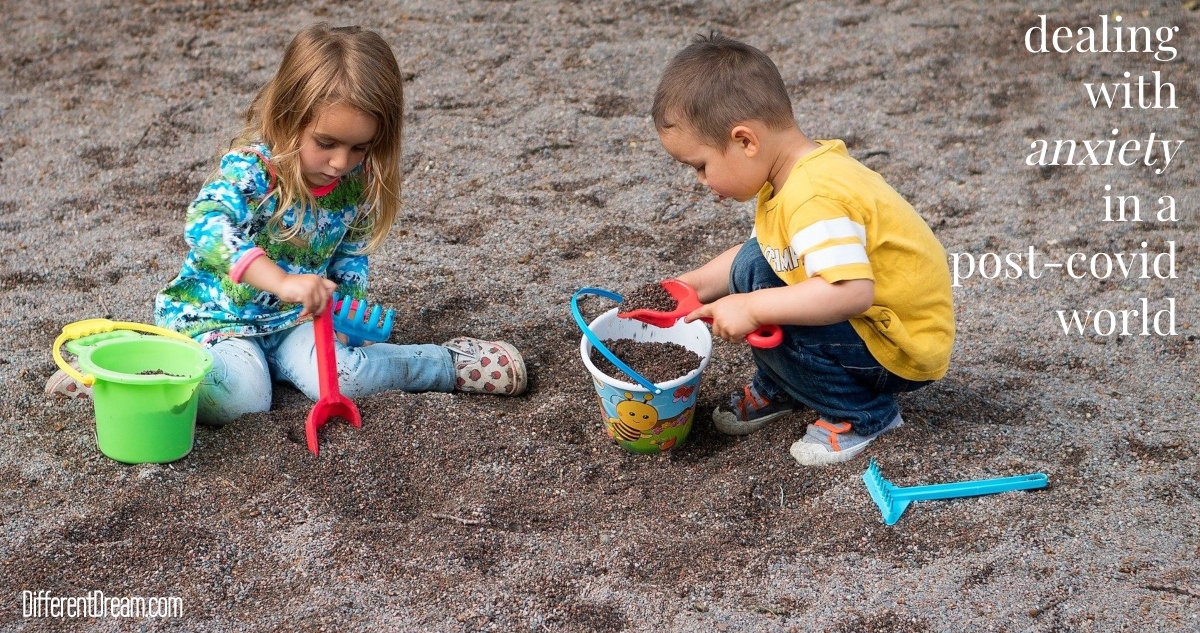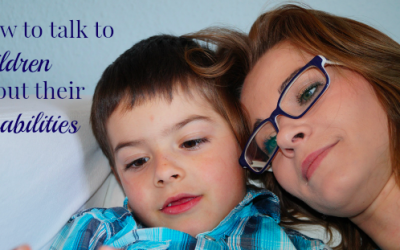Anxiety in a Post-Covid World

Anxiety in a post-Covid world is the latest new reality in over a year of new realities. Clinical psychologist Liz Matheis is here today with 3 strategies to tame your anxiety as you and your family begins the process of re-entry.
Hooray, hooray! The end of the pandemic is coming!
Wait. Is it a hooray?
In one breath, you may feel relieved that life is returning to normal. But in the same breath you wonder what is normal 14 months after a pandemic that suddenly and drastically changed our lives.
Fourteen months ago, anxiety about a virus that we had never seen before entered our lives. Before we knew it, it was deemed a global pandemic. I remember where I was exactly and who I was with when I first heard that news. It was mind blowing and overwhelming.
This virus was far more than just a flu. Our anxiety became intense and constant as it created fierce symptoms and many didn’t survive.
For many of us, that anxiety has actually not yet settled. We carry a residual level of worry. We’ve adopted functional rituals such as disinfecting surfaces, washing doorknobs, washing our hands and wearing masks. We ask questions such as: “Does that restaurant have outdoor seating? Are those tables too close? Did that person just touch the door handle? Are my kids safe to go to school? What if I’m carrying the virus and pass it on to my parents/elderly relatives?” The list goes on and on.
In the next few months, we will be transitioning from isolating to socializing. Many of us haven’t spoken to another person in close proximity for a long while. During the pandemic our conversations were shorter and at a distance, whether it be a driveway, lawn or a street. What’s been the topic of those conversations? The pandemic.
This transition will mean shifting our mindset from “it’s not safe to be around other people,” to “It’s okay to be around other people again.” We need to give ourselves permission to re-integrate back into the world and to deal with our anxiety in a post-Covid world. These 3 strategies can help us do that.
Acknowledge Your Fears
Letting go of fears about the COVID-19 virus won’t be easy. These thoughts have grown over 14 months so changing them will take some time. Be patient with yourself. Acknowledge your fears often. Write them down. Speak with a therapist about them. Rather than allowing them to consume you, recognize that they exist. Give them credence but avoid letting them hold you back.
Identify Your Preferences
Begin to think about your preferences regarding re-entry. You may wish to socialize with other families where the parents have been vaccinated and their kids have had limited interaction with other kids. Whatever your preferences, you may wish to have a conversation with others prior to socializing or play dates. How will we greet each other? Can we hug, or should we fist pump or wave?
You’re going to be creating the “do’s and don’ts” of meeting with other people and find your clan who is on the same page with you.
Ease In
We are best able to adjust to change when we can take baby steps. Therefore you should identify how you would like to ease into socializing. For example, you may want to socialize outside as the warm weather is approaching with a limited number of people. Once you have greater data about the virus and feel a bit more comfortable, you may want to increase the number of people you are willing to gather with and expand your parameters.
Create a “hierarchy” of least anxiety provoking to most anxiety provoking situations for yourself and the parameters around them. For example, gathering with 2 other families inside my house with no masks may be very anxiety provoking so you won’t start there.
As the world begins to open up, sit down with your significant other and decide on how you would like to re-enter the post-COVID world. Think about which safety precautions you wish to continue to take and which ones you wish to let go. There is no manual for anxiety in a post-Covid world, so whatever you decide works for you is what you should do.
Do you like what you see at DifferentDream.com? You can receive more great content by subscribing to the monthly Different Dream newsletter and signing up for the daily RSS feed delivered to your email inbox. You can sign up for the first in the pop up box and the second at the bottom of this page.

By Liz Matheis
Dr. Liz Matheis is a clinical psychologist and school psychologist in Parsippany, NJ. She offers support, assessments, and advocacy for children who are managing Autism Spectrum Disorders, ADHD, learning disabilities, and behavioral difficulties, as well as their families. She is also a contributor to several popular magazines. Visit www.psychedconsult.com for more information.
Subscribe for Updates from Jolene
Related Posts
How to Talk to Children About Their Disabilities
Trish Shaeffer shares the guidelines about how to talk to children about their disabilities that she’s field tested with her three sons.
6 Special Needs Tent Camping Tips
Do you want to try special needs tent camping with your kids? Guest blogger Trish Shaeffer shares tips her family uses to take their kids who use wheelchairs tent camping.
How to Raise a Health Care Self-Advocate
Do you want your child with special needs to be a health care self-advocate? Here are seven ways to increase a child’s self-advocacy skills.






0 Comments